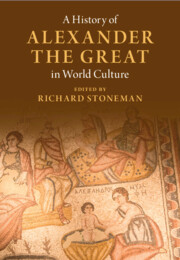Book contents
- A History of Alexander the Great in World Culture
- A History of Alexander the Great in World Culture
- Copyright page
- Contents
- Figures
- Notes on Contributors
- Preface
- Abbreviations
- 1 Introduction
- 2 Alexander and Alexandria in Life and Legend
- 3 The Image of Alexander in Ancient Art
- 4 Alexander, Philosophy and Rome
- 5 Christianising Alexander Traditions in Late Antiquity
- 6 Alexander in Ancient Jewish Literature
- 7 The Medieval Alexander
- 8 Alexander the Great and the Crusades
- 9 The Slavic Alexander
- 10 Alexander the Great in Byzantine Tradition, AD 330–1453
- 11 The Spanish Alexander
- 12 The Persian Alexander (1)
- 13 The Persian Alexander (2)
- 14 Alexander in Medieval Arab Minds
- 15 Alexander in the Age of Shakespeare
- 16 Alexander the Great in Opera
- 17 Alexander in the Long Eighteenth Century (c.1660–1830)
- 18 Images of Alexander in Germany
- 19 Alexander the Gay and the Gloryhole That Was Greece
- Index
- References
5 - Christianising Alexander Traditions in Late Antiquity
Published online by Cambridge University Press: 13 January 2022
- A History of Alexander the Great in World Culture
- A History of Alexander the Great in World Culture
- Copyright page
- Contents
- Figures
- Notes on Contributors
- Preface
- Abbreviations
- 1 Introduction
- 2 Alexander and Alexandria in Life and Legend
- 3 The Image of Alexander in Ancient Art
- 4 Alexander, Philosophy and Rome
- 5 Christianising Alexander Traditions in Late Antiquity
- 6 Alexander in Ancient Jewish Literature
- 7 The Medieval Alexander
- 8 Alexander the Great and the Crusades
- 9 The Slavic Alexander
- 10 Alexander the Great in Byzantine Tradition, AD 330–1453
- 11 The Spanish Alexander
- 12 The Persian Alexander (1)
- 13 The Persian Alexander (2)
- 14 Alexander in Medieval Arab Minds
- 15 Alexander in the Age of Shakespeare
- 16 Alexander the Great in Opera
- 17 Alexander in the Long Eighteenth Century (c.1660–1830)
- 18 Images of Alexander in Germany
- 19 Alexander the Gay and the Gloryhole That Was Greece
- Index
- References
Summary
This chapter explores Alexander’s legacy in early Christian literature, arguing that the Christians appropriated his figure by means of subtle alterations to existing tales or comparisons of his deeds with Christian content. It focuses on the common ground between Christians and non-Christians, and looks at first, the classicising ‘pagans’ (Celsus, Porphyry, Julian); secondly, the Greek-writing Jewish authors (Philo of Alexandria, Flavius Josephus); and, thirdly, authors of the Christian comparative material. In each case, I show how Christian authors use either established or innovative strategies in deploying Alexander as a rhetorical device to enhance the effect of their argument. I offer several close readings of important if neglected passages to highlight how different the Christians’ presentations of Alexander actually are from the material they are adapting. The chapter suggests the ‘Christianisation’ of Alexander lies primarily in the Christians’ interpretation of his legacy and in their use of comparative material rather than in their development of a wholly new image for Alexander himself.
Keywords
- Type
- Chapter
- Information
- A History of Alexander the Great in World Culture , pp. 86 - 108Publisher: Cambridge University PressPrint publication year: 2022
References
- 1
- Cited by



